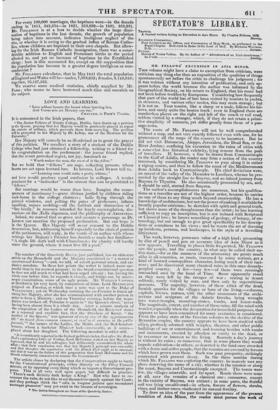The number of the Quarterly &ricer. just published, has an
elaborate article on the Household and the Ministry considered as a matter of constitutional history "—and, we add, of covert personal attack, and ex- clusive anecdote. In these last points the writer is indeed more suc- cessful than in his avowed purpose : to the broad constitutional question he does not add much to what had been urged already ; but, haying the whole case before him, he regards it closely, and brings out, by micro- scopic examination, some of its ugly points. Mr. Wiu.r.tm COWPER at Hertford is hit very hard, by comparison of dates. Lord MELBOURNE resigned on Tuesday, at which time a note was sent to the Duke of M. ELLINGTON ; yet on Wednesday morning the ex-Premier is found ad- vising her Majesty, after she has communicated with another person in order to form it Ministry ; and on Thursday evening, betbre tile nego- tiation was broken off, Polonius is again in the Queen's closet," never haying been absent from it a whole day. After a minute analysis of the composition of the Ladies of the Household, the Reviewer states as a reported and credible fact, that the Dutehess of KENT, " the mother of the Queen," was ignorant of every one of the appointments till " she heard from common rumour, or add he.rt morning in the /addle Jorhall,"* the names of the Ladies, the 1:tids, and the Betlehat aber- women, whom a bachelor Minister had—irrerw,11,10, as it seems— placed about her daughter. The ffillowing anecdote is odder still.
"It is confidently reported in the highest political circles, diatafter Sir Robert Peel's ed7planatory.ktter of Priday, Lord .Melhourne waited on her 3lajcsty to represent, that he and tile culleaines hail deliberately reconsidered the whole allau; that their conclusion was that her Majesty's principle was untenable, and that therefore the negotiation letth Sir Robert Peel ought to be renewed; and that it was on the failure of this proposition that Lord Melbourne and his friends reluctantly consented to resume the Government."
The article closes by declaring that the Conservatives ought to battle for the Constitutional principle, either directly on the Privy Council minute, or by opposing every thing which so impure a Government pro- poses. This is all very well upon paper, but difficult in practice. " Here s such divinity doth hedge a King." Men who have to en- counter the rubs, do not like to set themselves openly against the Court; and they perhaps think the " odia in long= jaeiens gum reconderet auctaque promeret" may yet exist in the breasts of sovereigns.
• The Italics throughout are those of the Quarterly Review.


























 Previous page
Previous page